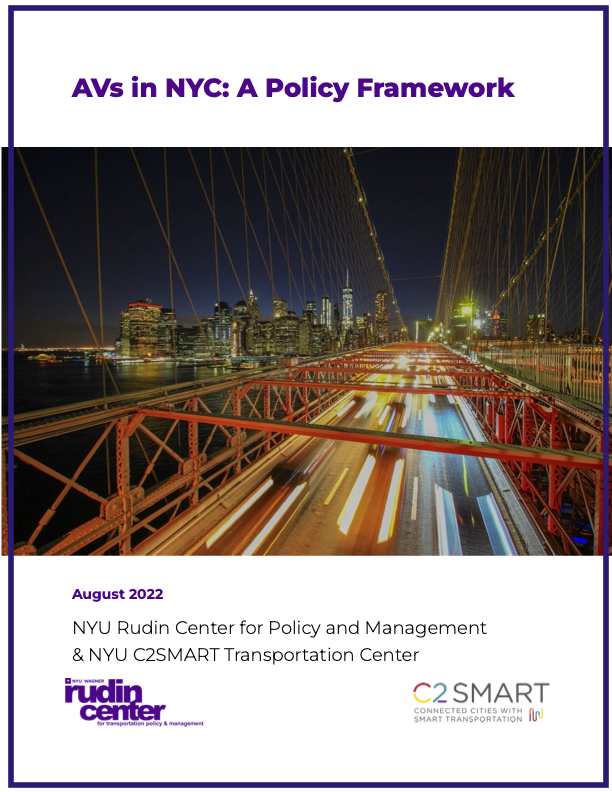AVs in NYC: A Policy Framework
While the reality of autonomous vehicles in New York City remains several years away, this timeline grants us the opportunity to set up a policy model for equitable, safe and accessible mobility.
Although AVs are regulated for safety and efficacy within the transportation realm, they are rarely evaluated from a policy perspective. Autonomy’s impacts will be far-reaching, prompting significant social concerns like potential job displacement, equitable neighborhood access, and data privacy.
To establish a framework for considering these wraparound AV impacts in New York City, the NYU Rudin Center for Transportation Policy and Management led a multi-stakeholder initiative in conjunction with NYU’s C2SMART, USDOT University Transportation Center. The team hosted three workshops in December 2021 addressing issues and opportunities in seven topic areas: Local Governance, Community Outreach, Integration with Public Transit, Equity, Accessibility, Safety and Data Privacy. Participants represented the public and private sectors, advocacy and civic organizations, and academia.
In addition, the research team conducted a quantitative study of equitable deployment of new mobility in New York City. The study finds that the ideal data aggregation level depends on the reliability of the public data collected for that community, and recommends a new tool to help design the appropriate data structure for data sharing.
Based on this foundational research and stakeholder input, seven mobility policy principles are presented as a preliminary framework for approaching the wraparound policies concerning the introduction of autonomous vehicles to New York City:
-
Safety, and public trust in that safety, is paramount to the introduction of autonomous vehicles on city streets.
-
Serve all New Yorkers equitably, raising the voices of our diverse populations in developing, testing and using AVs to make them accessible to all.
-
Engage New York’s diverse communities, hearing out community goals and concerns while also promoting innovation and equity.
-
Shared-ride autonomous vehicles must coexist with public transportation, which continues to serve as the lifeblood of New York City.
-
New technologies introduced by AVs should foster increasingly intelligent interactions with the city.
-
Adoption of AVs must augment New York City’s ongoing sustainability efforts, including vehicle electrification, minimized vehicle miles traveled, and sharing rides.
-
Public-private partnerships are key to setting and achieving safety, equity and sustainability goals.
These policy principles are intended to establish cross-sector strategic partnerships to advance both public innovation and social tenets. By centering the city’s goals of equity, safety, and sustainability, this initiative aims to ensure that AVs sufficiently support and move New Yorkers.
